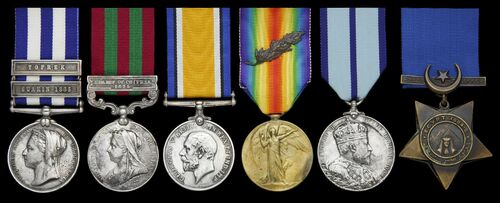
Auction: 24001 - Orders, Decorations and Medals
Lot: 227
A superb campaign group of six awarded to Colonel A. G. Peyton, 9th Bengal Cavalry, who was 'mentioned' for his service in Sudan and twice more during the Great War
Egypt and Sudan 1882-89, undated reverse, 2 clasps, Suakin 1885, Tofrek (Lieut: A. G. Peyton. 9th Bengal. Cav:); India General Service 1895-1908, 1 clasp, Relief of Chitral (Capt. A. G. Peyton 9th Bl. Lcrs.); British War and Victory Medals (Col. A. G. Peyton.), with M.I.D. oakleaves; Delhi Durbar 1903, unnamed as issued; Khedive's Star 1884, contact marks and pitting to first and second, edge wear to initials of second, overall very fine (6)
Algernon George Peyton was born at Clarence Cottage, Penzance on 3 October 1859, the son of Fanny and Captain Lumley Payton, Royal Navy. Educated at Woking College he was commissioned 2nd Lieutenant with the 6th Foot on 11 August 1880 before being transferred to the 70th Foot that same year. Advanced Lieutenant on 1 July 1881, the same year the Regiment amalgamated to form the East Surrey Regiment, he transferred to the Indian Army on 25 April 1884, joining the 9th Bengal Cavalry.
Egypt
The Regiment was posted to Suakin, arriving on 10 March 1885, having been converted to lancers during the journey. They were present for the action at Hashin on 20 March and suffered losses of 12 killed and 16 wounded due to one squadron serving dismounted.
At Tofrek a squadron of the 20th Hussars was riding from the zariba to Suakin led by Major Graves when they met Peyton leading a Squadron of the 9th as relief. Hearing gunfire Graves immediately led both units back the way they came and discovered a column of refugees under attack by Dervishes. They dismounted and engaged the Dervishes while Peyton was ordered to intercept a flanking move by the Mahdist troops.
He succeeded and went on to escort the refugees back to safety, this earned him a 'mention' for his leadership. Returning to India Peyton continued to serve and was advanced Captain on 11 August 1891.
India
Still with the 9th during the Relief of Chitral expedition in 1895 Peyton was advanced Major on 11 August 1900, while serving as Deputy Assistant Adjutant General. At the end of the year, he was appointed second-in-command of the regiment while also Assistant Adjutant General.
Appointed Deputy Assistant Adjutant General at Peshawar on 15 November 1902 he was still serving in this role during the 1903 Delhi Durbar. During this event the regiment was also re-christened the 9th Hodson's Horse. Peyton went on to act as Brigade Major for the Ambala Cavalry Brigade from 27 December 1904-22 May 1905, being advanced Lieutenant-Colonel the next year on 11 August 1906.
Appointed Commandant of the Regiment on 1 December 1907 he was advanced Brevet Colonel on 6 April 1910 and confirmed in the rank on 1 January 1911. However age was catching up with him and he retired the next year on 19 August.
Great War
There he might have remained however the outbreak of the Great War saw him return to the colours on 20 August 1915 as Lieutenant-Colonel responsible for training the 2/7th Worcestershire Regiment, Territorial Force. Appointed a commandant with the Lines-of-Communication in May 1916 Peyton received his first 'mention' here (London Gazette 15 June 1916, refers).
Joining the Regiment in France later in the month Peyton served most of the year with them before being transferred to command the reinforcements depot at Etaples. He later accepted similar roles at Marseilles and Rouen, being mentioned again while there (London Gazette 31 December 1918, refers).
After the war Peyton retired to Weymouth and thence to Eastbourne where he died on 23 April 1938 leaving a wife and two daughters; sold together with copied research comprising census data, medal rolls and extracts from Hodson's Horse and War Services of Officers of the Army.
Subject to 20% VAT on Buyer’s Premium. For more information please view Terms and Conditions for Buyers.
Sold for
£1,000
Starting price
£700




